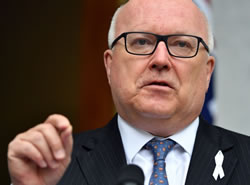 A former Australian diplomat has accused United Kingdom Public Servants of resisting trade negotiations with Australia because of their “anti-Brexit stance”.
A former Australian diplomat has accused United Kingdom Public Servants of resisting trade negotiations with Australia because of their “anti-Brexit stance”.
George Brandis, who left his role as High Commissioner to the UK last month, said officials in the Department for Environment, Food and Rural Affairs and other Departments did everything they could to place roadblocks to the deal.
Mr Brandis (pictured) said the default position from Public Servants during the UK-Australian trade negotiations was “horror at Brexit”.
He described this as “reluctance bordering on hostility” in some Departments — most notably the Department for Environment, Food and Rural Affairs, which is responsible for British farming.
“It was kind of like a cringe or a crouch, recoiling and willing it not to happen,” Mr Brandis said in a magazine interview.
“Or being in denial that it was happening.”
A Government spokesperson responded: “Civil Servants deliver Government policy with honesty, integrity, objectivity and impartiality, and we are continuing to maximise the opportunities of leaving the European Union through a new Brexit Freedoms Bill.”
Trade negotiations between the UK and Australia began in June 2020 amid a reported Cabinet dispute over the impact tariff-free imports of Australian lamb and beef would have on British farming.
Secretary for the Environment, George Eustice and then-Secretary for Trade, Liz Truss were said to be locked in an “absolutely ferocious” row a month before negotiations began over the farming concerns.
Then-Minister for the Cabinet Office, Michael Gove and Secretary for Business, Kwasi Kwarteng reportedly backed Mr Eustice, while then-Minister for Brexit, David Frost was on Ms Truss’s side.
The two countries agreed a deal in December, including tariff-free beef and lamb, which the Government said would boost trade between the two countries by £10.4 billion ($A18.4 billion)
Mr Brandis, who was High Commissioner to the UK throughout the talks, said he had to form an alliance with Ms Truss, who had “the political will… to drive and cut through the bureaucratic and institutional inertia and reluctance”.
He said it was a case of fighting with a “large element of the Whitehall establishment”.
London, 8 May 2022





